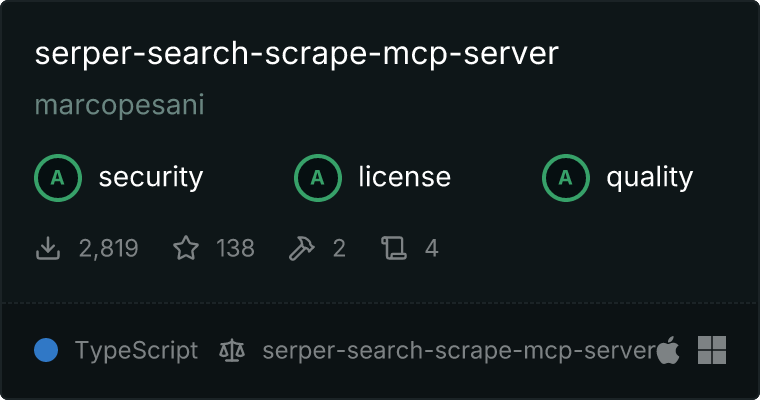Serper Search and Scrape MCP Server

A TypeScript-based MCP server that provides web search and webpage scraping capabilities using the Serper API. This server integrates with Claude Desktop to enable powerful web search and content extraction features.

Features
Tools
Requirements
- Node.js >= 18
- Serper API key (set as
SERPER_API_KEY environment variable)
Development
Install dependencies:
npm install
Build the server:
npm run build
For development with auto-rebuild:
npm run watch
Run tests:
npm test # Run all tests
npm run test:watch # Run tests in watch mode
npm run test:coverage # Run tests with coverage
npm run test:integration # Run integration tests
Environment Variables
Create a .env file in the root directory:
SERPER_API_KEY=your_api_key_here
Debugging
Since MCP servers communicate over stdio, debugging can be challenging. We recommend using the MCP Inspector, which is available as a package script:
npm run inspector
The Inspector will provide a URL to access debugging tools in your browser.
Installation
Installing via Smithery
To install Serper Search and Scrape for Claude Desktop automatically via Smithery:
npx -y @smithery/cli install @marcopesani/mcp-server-serper --client claude
Claude Desktop
Add the server config at:
MacOS: ~/Library/Application Support/Claude/claude_desktop_config.json
Windows: %APPDATA%/Claude/claude_desktop_config.json
{
"mcpServers": {
"serper-search": {
"command": "npx",
"args": ["-y", "serper-search-scrape-mcp-server"],
"env": {
"SERPER_API_KEY": "your_api_key_here"
}
}
}
}
Cline
- Open the Cline extension settings
- Open "MCP Servers" tab
- Click on "Configure MCP Servers"
- Add the server config:
{
"mcpServers": {
"github.com/marcopesani/mcp-server-serper": {
"command": "npx",
"args": ["-y", "serper-search-scrape-mcp-server"],
"env": {
"SERPER_API_KEY": "your_api_key_here"
},
"disabled": false,
"autoApprove": ["google_search", "scrape"]
}
}
}
Additional Cline configuration options:
disabled: Set to false to enable the serverautoApprove: List of tools that don't require explicit approval for each use
Cursor
- Open the Cursor settings
- Open "Features" settings
- In the "MCP Servers" section, click on "Add new MCP Server"
- Choose a name, and select "command" as "Type"
- In the "Command" field, enter the following:
env SERPER_API_KEY=your_api_key_here npx -y serper-search-scrape-mcp-server
Docker
You can also run the server using Docker. First, build the image:
docker build -t mcp-server-serper .
Then run the container with your Serper API key:
docker run -e SERPER_API_KEY=your_api_key_here mcp-server-serper
Alternatively, if you have your environment variables in a .env file:
docker run --env-file .env mcp-server-serper
For development, you might want to mount your source code as a volume:
docker run -v $(pwd):/app --env-file .env mcp-server-serper
Note: Make sure to replace your_api_key_here with your actual Serper API key.
